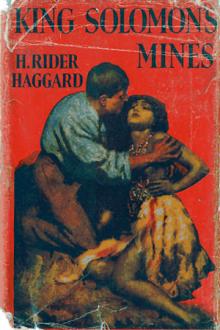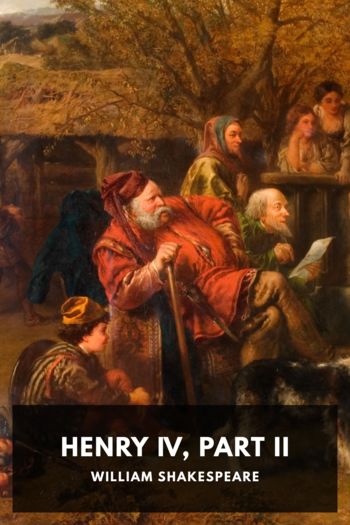King Solomon’s Mines, H. Rider Haggard [best mystery novels of all time TXT] 📗

- Author: H. Rider Haggard
Book online «King Solomon’s Mines, H. Rider Haggard [best mystery novels of all time TXT] 📗». Author H. Rider Haggard
It appeared that Twala was at his principal place, known as Loo, making ready for the great annual feast which was to be held in the first week of June. At this gathering all the regiments, with the exception of certain detachments left behind for garrison purposes, are brought up and paraded before the king; and the great annual witch-hunt, of which more by-and-by, is held.
We were to start at dawn; and Infadoos, who was to accompany us, expected that we should reach Loo on the night of the second day, unless we were detained by accident or by swollen rivers.
When they had given us this information our visitors bade us good night; and, having arranged to watch turn and turn about, three of us flung ourselves down and slept the sweet sleep of the weary, whilst the fourth sat up on the lookout for possible treachery.
IX Twala the KingIt will not be necessary for me to detail at length the incidents of our journey to Loo. It took two full days’ travelling along Solomon’s Great Road, which pursued its even course right into the heart of Kukuanaland. Suffice it to say that as we went the country seemed to grow richer and richer, and the kraals, with their wide surrounding belts of cultivation, more and more numerous. They were all built upon the same principles as the first camp which we had reached, and were guarded by ample garrisons of troops. Indeed, in Kukuanaland, as among the Germans, the Zulus, and the Masai, every able-bodied man is a soldier, so that the whole force of the nation is available for its wars, offensive or defensive. As we travelled we were overtaken by thousands of warriors hurrying up to Loo to be present at the great annual review and festival, and more splendid troops I never saw.
At sunset on the second day, we stopped to rest awhile upon the summit of some heights over which the road ran, and there on a beautiful and fertile plain before us lay Loo itself. For a native town it is an enormous place, quite five miles round, I should say, with outlying kraals projecting from it, that serve on grand occasions as cantonments for the regiments, and a curious horseshoe-shaped hill, with which we were destined to become better acquainted, about two miles to the north. It is beautifully situated, and through the centre of the kraal, dividing it into two portions, runs a river, which appeared to be bridged in several places, the same indeed that we had seen from the slopes of Sheba’s Breasts. Sixty or seventy miles away three great snow-capped mountains, placed at the points of a triangle, started out of the level plain. The conformation of these mountains is unlike that of Sheba’s Breasts, being sheer and precipitous, instead of smooth and rounded.
Infadoos saw us looking at them, and volunteered a remark.
“The road ends there,” he said, pointing to the mountains known among the Kukuanas as the Three Witches.
“Why does it end?” I asked.
“Who knows?” he answered with a shrug; “the mountains are full of caves, and there is a great pit between them. It is there that the wise men of old time used to go to get whatever it was they came for to this country, and it is there now that our kings are buried in the Place of Death.”
“What was it they came for?” I asked eagerly.
“Nay, I know not. My lords who have dropped from the Stars should know,” he answered with a quick look. Evidently he knew more than he chose to say.
“Yes,” I went on, “you are right, in the Stars we learn many things. I have heard, for instance, that the wise men of old came to these mountains to find bright stones, pretty playthings, and yellow iron.”
“My lord is wise,” he answered coldly; “I am but a child and cannot talk with my lord on such matters. My lord must speak with Gagool the old, at the king’s place, who is wise even as my lord,” and he went away.
So soon as he was gone I turned to the others, and pointed out the mountains. “There are Solomon’s diamond mines,” I said.
Umbopa was standing with them, apparently plunged in one of the fits of abstraction which were common to him, and caught my words.
“Yes, Macumazahn,” he put in, in Zulu, “the diamonds are surely there, and you shall have them, since you white men are so fond of toys and money.”
“How dost thou know that, Umbopa?” I asked sharply, for I did not like his mysterious ways.
He laughed. “I dreamed it in the night, white men;” then he too turned on his heel and went.
“Now what,” said Sir Henry, “is our black friend driving at? He knows more than he chooses to say, that is clear. By the way, Quatermain, has he heard anything of—of my brother?”
“Nothing; he has asked everyone he has become friendly with, but they all declare that no white man has ever been seen in the country before.”
“Do you suppose that he got here at all?” suggested Good; “we have only reached the place by a miracle; is it likely he could have reached it without the map?”
“I don’t know,” said Sir Henry gloomily, “but somehow I think that I shall find him.”
Slowly the sun sank, then suddenly darkness rushed down on the land like a tangible thing. There was no breathing-space between the day and night, no soft transformation scene, for in these latitudes twilight does not exist. The change from day to night is as quick and as absolute as the change from life to death. The sun sank and the world was wreathed in shadows. But not for long, for see in the west





Comments (0)